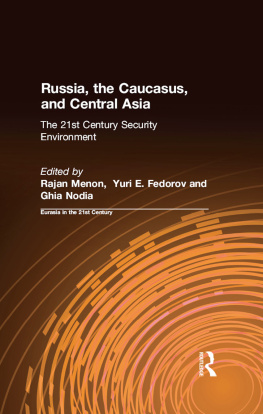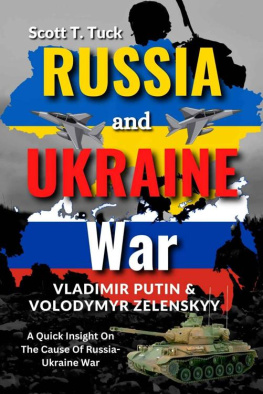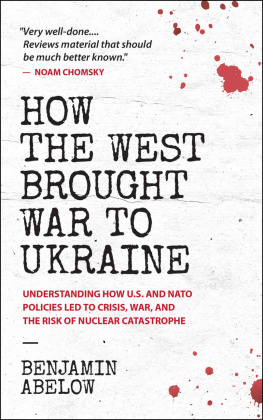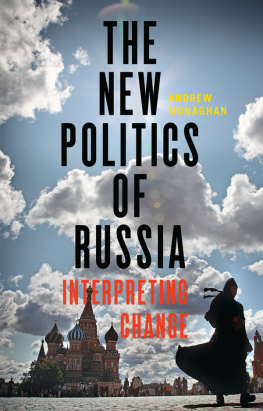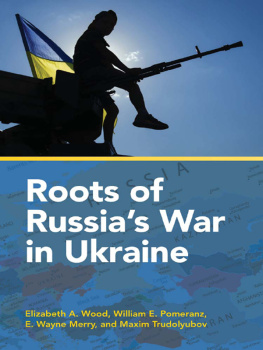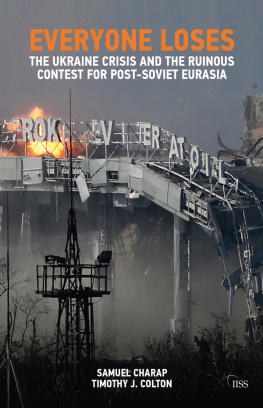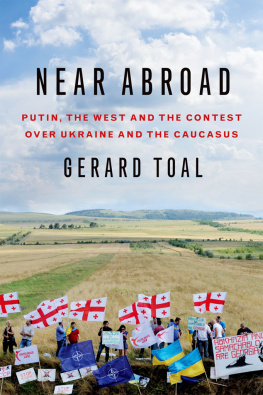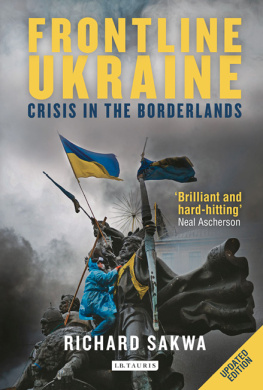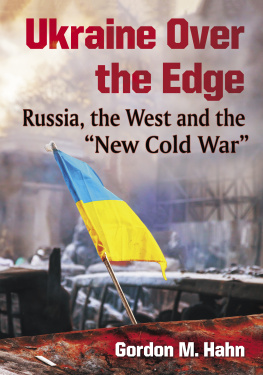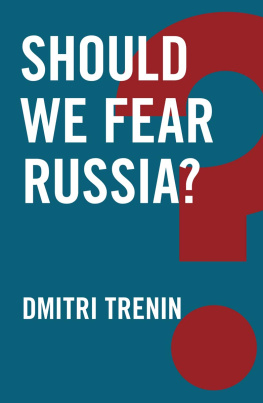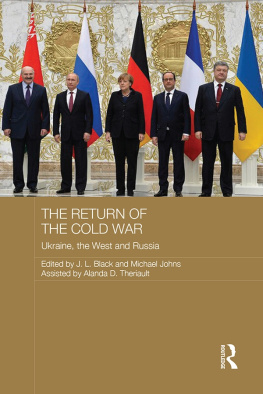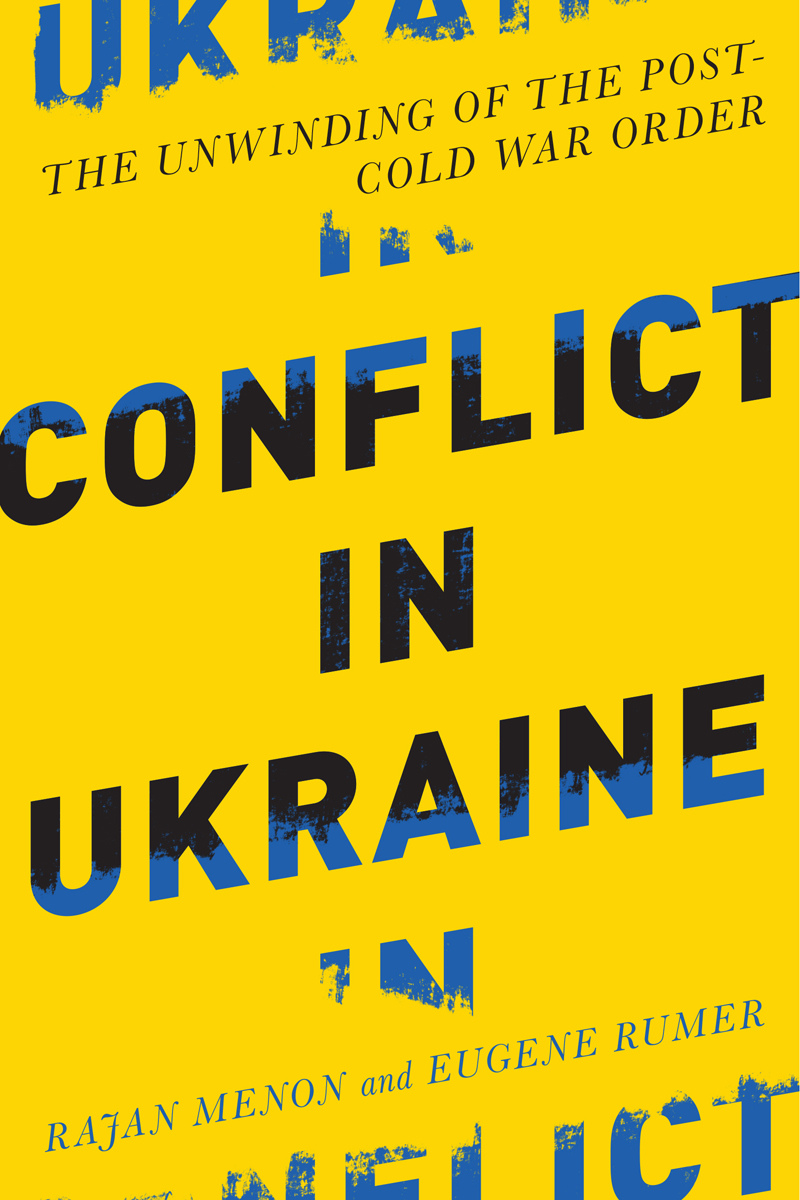Contents
List of figures
- Chapter 1
List of tables
- Chapter 1
- Chapter 4
Guide
2015 Massachusetts Institute of Technology
All rights reserved. No part of this book may be reproduced in any form by any electronic or mechanical means (including photocopying, recording, or information storage and retrieval) without permission in writing from the publisher.
MIT Press books may be purchased at special quantity discounts for business or sales promotional use. For information, please email .
This book was set in Stone by BostonReview.
Library of Congress Cataloging-in-Publication Data
Menon, Rajan, 1953
Conflict in Ukraine : the unwinding of the post-cold war order / Rajan Menon and Eugene Rumer.
pages cm. (Boston review originals)
Includes bibliographical references and index.
ISBN 978-0-262-02904-9 (hc. : alk paper) 978-0-262-53629-5 (pb.)
1. UkrainePolitics and government1991- 2. UkraineForeign relationsRussia (Federation) 3. Russia (Federation)Foreign relations Ukraine. 4. UkraineHistoryEuromaidan Protests, 2013-2014. 5. Crimea (Ukraine)Annexation to Russia. I. Rumer, Eugene B., 1958- II. Title
DK508.848.M462015
947.7086dc23
2014045556
109876543
d_r0
To Roger E. Kanet and Oles M. Smolansky (R.M.)
and
To the memory of Stephen M. Meyer (E.R.)
Introduction: Ukraine 2014
) Yanukovych's choice proved fateful, for the AA was no ordinary document. It was a symbol of hope for those Ukrainians (well represented in the country's central and western regions) who dreamed of integrating with Europe, but not for those (chiefly in the south and east) who favored retaining close ties with Russia.
Its provisions included forming a national unity government within ten days, pruning presidential powers, restoring the 2004 constitution, and organizing early elections, under new guidelines, by year's end. American and European leaders praised the compromise, and so did Russia, but it failed to stick on the street, and figures in the opposition bent on ousting Yanukovych rejected it. Any solution involving him became impossible. Having already lost the support of the parliament (Verkhovna Rada), he fled the following day, Feburary 22.
Yanukovych's ouster merely moved the crisis to a new, more dangerous phase. What many Ukrainians, along with Western governments, hailed as a revolution against a corrupt, authoritarian regime, Russia denounced as an extra-constitutional coup against an elected leader.
The Crimea referendum, held while paramilitary forces and Russian troops roamed the streets, met none of these requirements. Moreover, the vote was organized by pro-Russian politicians who had recently seized power by force and whose leader's party, Russia Unity, won a mere four percent of the vote in the previous elections to the local parliament in October 2010.
Russian forces, both those already based in Crimea and others sent to reinforce them, started sealing off the peninsula and taking over installations. Amidst the upheaval, the referendum passed, and within days, Russia formally annexed Crimea with a treaty of accession.
This initiated another chain reaction. Armed rebels in the eastern provinces of Donetsk and Luhansk (the Donbas region) seized installations, proclaimed republics, and readied for Crimea-like referendums, doubtless banking on Russia's backing. Ukraine seemed to be fragmenting. The Russian media began an information campaign to cast the Kyiv government in the worst light, linking it to the far-right and pro-Nazi forces of the 1940s and stoking the fears of the Russophone and ethnic Russian population in the Donbas. Speculation mounted about a Russian invasion in support of the insurgents.
Together, these unexpected events produced an atmosphere of emergency and the urgency of a genuine crisis.
Like most international political crises, this one was marked by mounting fears that war might soon eruptand spread. Faced with a full-blown insurgency in Donetsk and Luhansk, the new Ukrainian government proclaimed an anti-terrorism campaign in April. Soon, Ukraine's army and National Guard, together with an array of private militias acting as free agents, were at war with the rebels, and the violence intensified after the May referendums on self-rule in the two eastern provinces. That, in turn, heightened the fear of a Russian invasion in support of the insurgentsespecially as Moscow massed troops along Ukraine's border and staged military maneuvers in nearby Russian regionseven though Putin asked for the Donbas referendums to be delayed and failed to recognize the republics that were proclaimed in their aftermath. Estonia, Latvia, and Lithuania, the NATO members most directly exposed to a wider military confrontation, implored their allies for demonstrations of support, including the deployment of troops. The question became how Russia would react if NATO obliged.
Typically, opposing sides entangled in a crisis tend to believerightly or wronglythat critical interests are at stake and that their adversaries will interpret signs of conciliation as weakness. This phenomenon was apparent in Ukraine, where the contending parties were disinclined to draw back and determined to demonstrate resolve. That mindset increased the tension, and with it the fear that misperception, faulty information, miscalculation, or even an accident would create a spiraling confrontation. There were (hyperbolic) comparisons between 2014 and August 1914.
What has come to pass in Ukraineand what is still, as of this writing, underwayis a crisis for yet another reason: the rapid pace of developments and the sense of those caught up in them that, to paraphrase Ralph Waldo Emerson, events are in the saddle, having acquired their own momentum and power. Those making critical decisions under such circumstances fear a loss of control. Entrenched assumptions harden, antagonists assume the worst, anxiety increases, and pessimism prevails. Ukraine has been no exception.
Thus Ukraine 2014 qualifies as classic crisisindeed the worst to emerge between Russia and the West since the end of the Cold Warand one that will be explored and debated for decades to come. By the time it erupted, Western attitudes toward Russia had already begun to harden, thanks in large part to the 2008 Russia-Georgia war and Putin's tightening of political controls within Russia. President Obama's effort to improve the situation with a reset of relations with Russia was withering on the vine. This context made it even harder to calm the crisis, and the rhetorical salvos exchanged by Russia and the West did not help matters. Amidst the rising political temperature, compromise by any of the contending parties risked being dismissed by critics as nave, even pusillanimous. In all, it was an unpropitious setting for diplomacy.
But the crisis in Ukraine had even wider ramifications. Convinced that Russia's political support and supply of arms were the taproots of the Donbas insurgency, the United States and Europe imposed economic sanctions, which increased in severity in July after a Malaysia Airways passenger jet was shot down over eastern Ukraine (almost certainly by a missile fired by the insurgents at what they had assumed was a military aircraft), killing nearly 300 passengers and crew. Moscow responded to the sanctions with an amalgam of nonchalance and defiance, rolling out its own economic penalties and threatening more. The sanctions, the suspension of Russia from the G-8 bloc of global economic powers, and the cessation of NATO's political cooperation with Moscow shredded the relationship between Russia and the West and threatened the entire postCold War European political-military order. The larger imperative of cooperating to advance common interests fell by the wayside. Instead, in the press and among experts there was talk of a new Cold War, a colorful but facile comparison.


